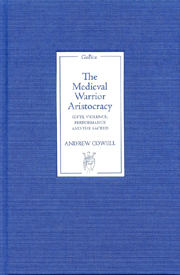Book contents
- Frontmatter
- Contents
- Acknowledgements
- Introduction
- 1 The Power of Giving
- 2 The Symbolic Constitution of the Giving Subject: William the Conqueror and Robert Guiscard
- 3 Violence and “Taking”: Towards a Generalized Symbolic Economy
- 4 Taking an Identity: The Poem of the Cid
- 5 The Sacred Kept
- 6 The Hero, Gratuity and Alterity: The Song Of Roland
- 7 The Supplemental Hero: Raoul of Cambrai
- 8 Female Integrity and Masculine Desires in The Nibelungenlied
- 9 Fractured Identities, and the Solution of Chivalry: William of Orange
- Conclusion: A New, Different Warrior Aristocracy
- Works Cited
- Index
Introduction
Published online by Cambridge University Press: 12 September 2012
- Frontmatter
- Contents
- Acknowledgements
- Introduction
- 1 The Power of Giving
- 2 The Symbolic Constitution of the Giving Subject: William the Conqueror and Robert Guiscard
- 3 Violence and “Taking”: Towards a Generalized Symbolic Economy
- 4 Taking an Identity: The Poem of the Cid
- 5 The Sacred Kept
- 6 The Hero, Gratuity and Alterity: The Song Of Roland
- 7 The Supplemental Hero: Raoul of Cambrai
- 8 Female Integrity and Masculine Desires in The Nibelungenlied
- 9 Fractured Identities, and the Solution of Chivalry: William of Orange
- Conclusion: A New, Different Warrior Aristocracy
- Works Cited
- Index
Summary
Individuality and Identity in the Middle Ages
Within the field of medieval studies, a number of interrelated terms and concepts centered around the idea of the individual and individual identity have drawn a great deal of critical attention over the years. If we begin by citing Louis Dumont's definition of such an individual from his Essays on Individualism – ‘the independent, autonomous, and thus essentially nonsocial moral being” (Dumont 1986:25) – then broadly speaking, we can say that during much of the history of medieval studies, scholars largely rejected the possibility of such individuals in the Middle Ages. But in the 1960s and 1970s, a number of scholars began to point to at least the avatars of modern individualism in the Middle Ages. Among the most prominent examples which one could cite are Marie-Dominique Chénu's L'Eveil de la conscience dans la civilisation médiévale (1969) and colin Morris's The Discovery of the Individual 1050–1200 (1972). This trend produced a contrary response, epitomized in its early form by evelyn vitz's argument that medieval individual identity was always a matter of merely quantitative difference (being more beautiful, more heroic, etc.) and never a question of qualitative distinctions which we might call (from a modern perspective) “individualistic” (vitz 1975).
- Type
- Chapter
- Information
- The Medieval Warrior AristocracyGifts, Violence, Performance, and the Sacred, pp. 1 - 14Publisher: Boydell & BrewerPrint publication year: 2007



